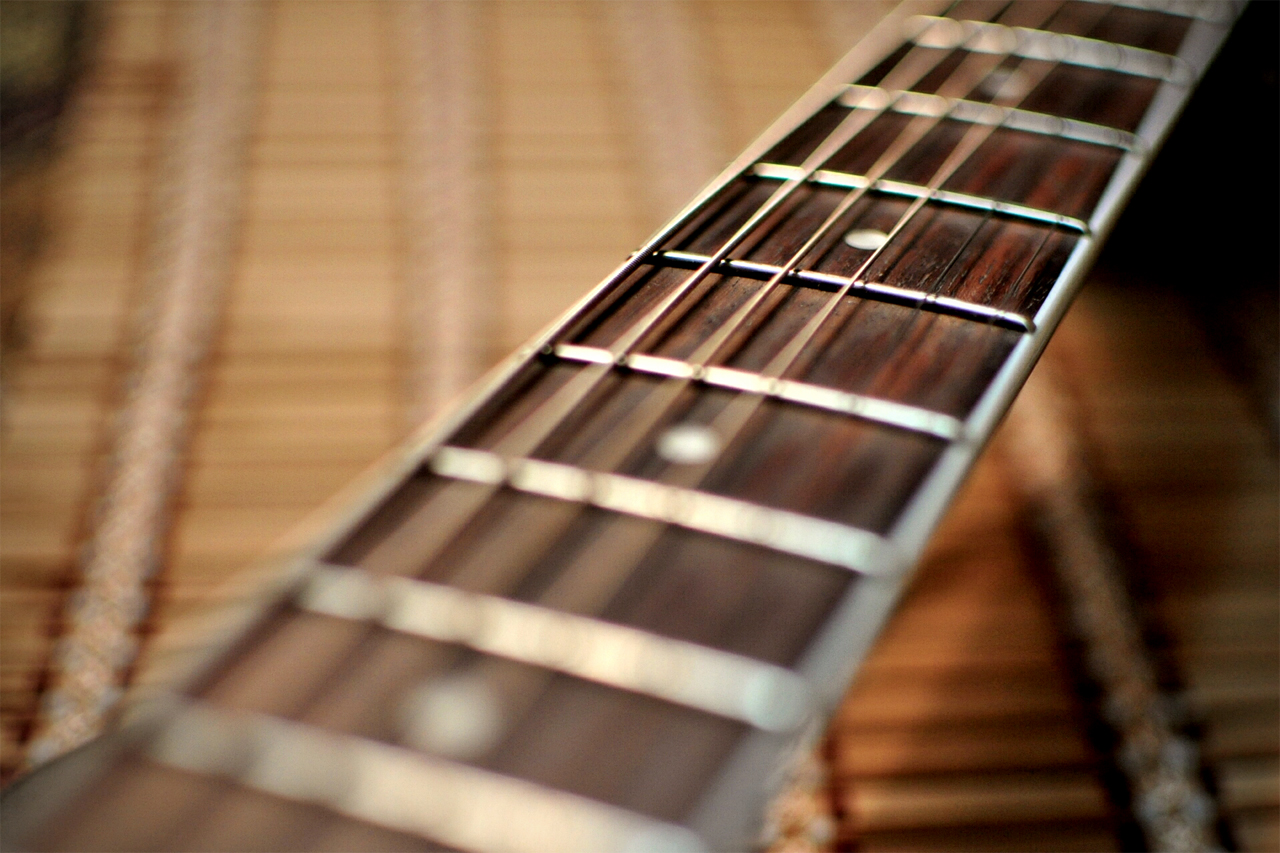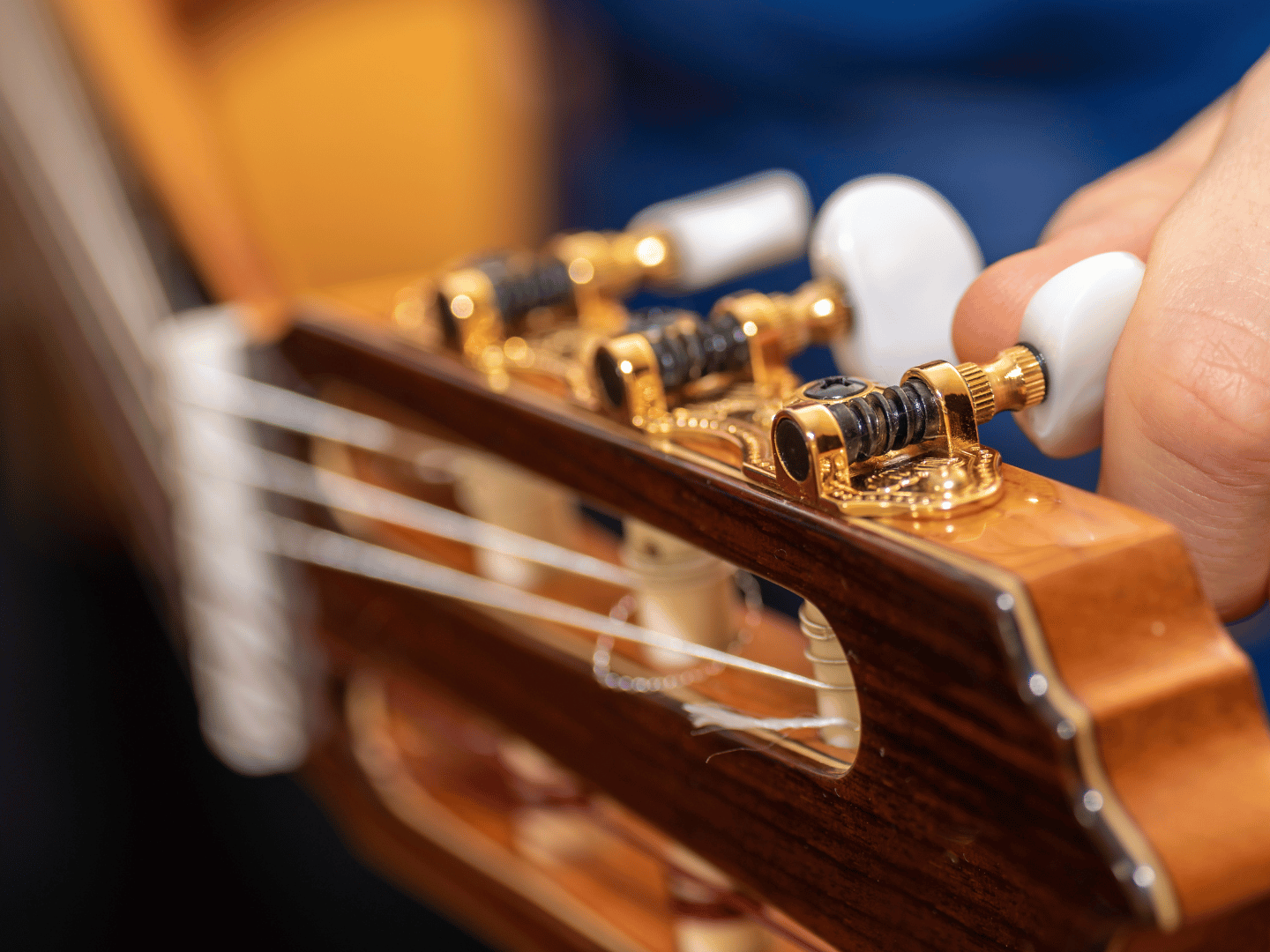There has always been an ongoing debate among guitar players about whether or not guitars should be kept in cases.
Guitars are one of the most beloved instruments in the world, and they’re versatile, portable, and relatively affordable.
On one hand, cases offer protection from outside elements and accidental damage, but on the other hand, they can be expensive and inconvenient.
So what’s the best solution? Let’s take a look at both sides of the argument to see which makes more sense for you.
Table of Contents
Should guitars be kept in cases when not in use?
The quick answer is that yes, guitars should be kept in cases when not in use. This helps to protect the instrument from damage and keep it clean. Also, ideally, this case should be a high-quality hardshell case that’s durable and strong.
I encourage you to read on as I’ll dive into the details of which type of case is best, and the benefits and risks of both keeping and not keeping your guitar in a case.
Let’s get started!
Benefits of keeping your guitar in a case
Guitars are often taken for granted, but, as any guitar player knows, they’re a lot like cars: they need to be taken care of in order to run well.
One way to take care of your guitar is by keeping it in a case when you’re not using it.
Here are 10 of the best benefits of doing so:
1. Protection from outside elements
Guitars are susceptible to outside elements, and if they’re not kept in a case, they can easily be damaged.
For example, if you leave your guitar in the sun, the heat can warp the wood, on the other hand, if it rains, the guitar can get wet and the wood can swell.

Also, if you live in an area with high humidity, the guitar can absorb moisture from the air and develop mold or mildew.
Keeping your guitar in a case prevents these things from happening and adds an extra layer of protection to your instrument.
2. Reduced risk of damage
Even if your guitar isn’t damaged by outside elements, there’s still also a chance that it could be damaged accidentally.
For example, if you knock it off a table, if it falls out of your car, or even while moving around you can accidentally hit something in your surroundings.
A good quality case will help to protect the guitar from these types of accidents.
3. Protection from pets and children
Pets and children can also be a danger to your guitar if it’s not in a case.
For example, if a pet jumps up on the couch where your guitar is sitting, they could easily knock it off the edge and onto the floor, where it could potentially break.
And if a child grabs your guitar without knowing how to hold it properly, they could easily damage the strings or even worse the neck of the guitar.
Cases, specially hardshell cases, will make it harder for the young ones to figure out how to get to the guitar, and even better, they keep it out of sight.
4. Less dust and dirt buildup
Another benefit of keeping your guitar in a case is that it will stay clean.
Guitars can easily accumulate dust and dirt over time, and this can affect the sound of the instrument.
Also, when it gets into the strings, it can cause them to break very easily shortly after you attempt to play the instrument.
Keeping your guitar in a case will prevent this from happening and help to keep it in adequate condition.
5. Reduced risk of theft
Theft is always a possibility when it comes to guitars, and if your guitar is not in a case, it’s an easy target.
Cases make it more difficult for thieves to steal your guitar as they have to take the time to figure out how to open it, and by that time someone could potentially notice them.
Here’s a video from 2022 in which a man steals an $8,000 Les Paul guitar by shoving it down his sweatpants:
Also, if your guitar is in a case, it’s more likely that you’ll notice if it’s missing since cases, specially hardshell ones, tend to be very big in size.
6. Easier transport
If you’re like me, you don’t like having to carry your guitar around by the neck, it’s uncomfortable and can easily damage the instrument.
A good case will have a strap or handle that will make it easier to transport the guitar without putting any stress on it.
When it’s time to take your guitar somewhere, it’s a lot easier to transport if it’s in a case, otherwise, it’ll just be laying around and prompt to be hit accidentally.
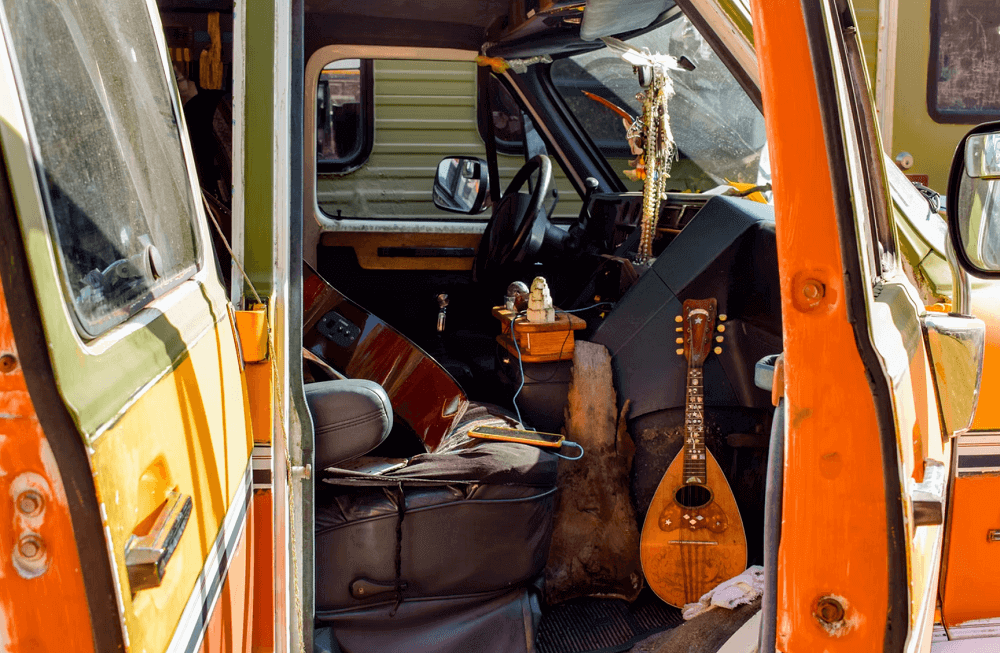
I used to think that I’d take care of my guitar so much that nothing would happen if I didn’t bring a case with me when I was moving around.
The odds are not in your favor, a sudden car stop or even a harsh turn can be the ultimate cause!
7. Enhanced resale value
If you’re ever thinking about selling your guitar, a case will add to the resale value.
Since a case is a valuable accessory that not many people have, it can be seen as an extra bonus for the buyer.
This is especially true if the case is a hardshell one, as they tend to be more expensive.
More importantly, if your guitar is in great condition because you’ve taken care of it by using a case, the value of the guitar will be as high as possible.
8. Keeps the humidity levels stable
If you live in an area with high humidity, it’s important to keep your guitar in a case as the moisture in the air can damage the instrument.
Not only can the humidity cause the wood to swell, but it can also lead to mold or mildew growth.
Cases help to keep the guitar shielded from the air and prevent these problems from happening.
9. Convenient storage for accessories
When it comes to guitar accessories, there are a lot of different things that you can buy.
But if your guitar is not in a case, it’s going to be difficult to find all of the accessories that you need in one place.
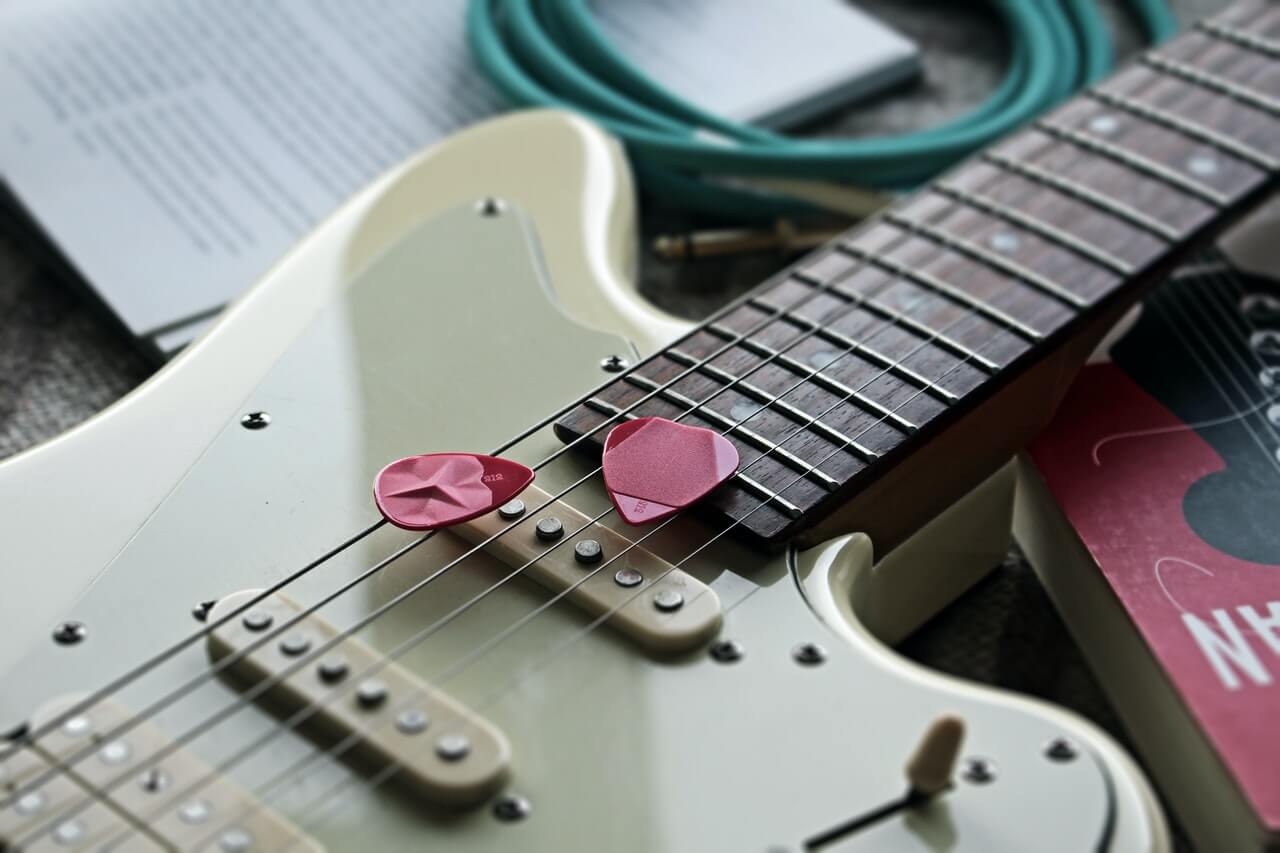
Cases, especially hardshell ones, come with storage compartments where you can store all of your accessories, such as picks, strings, capos, and more.
This way, you’ll always have everything you need at your fingertips and you won’t have to search through your house for them.
10. Peace of mind
Lastly, keeping your guitar in a case can give you peace of mind.
This is especially true if you’re someone who travels with your guitar often.
If your guitar is in a hardshell case, you don’t have to worry as much about it getting damaged or dirty.
Now, the benefits of keeping your guitar in a case are clear, but there are also some risks associated with not doing so.
How to choose the right guitar case for your needs?
When it comes to transporting your guitar, you want to make sure you’re using the right case for your needs.
There are a few different factors to consider when choosing a guitar case, such as the size and weight of your instrument, how much protection you need, and what type of transportation you’ll be using.
Keep reading for our quick guide on how to choose the right guitar case.
1. Consider the type of guitar you have
The first thing you need to do is consider the type of guitar you have.
If you have an acoustic guitar, you’re going to want a different case than someone who has an electric guitar.

This is because acoustic guitars are usually larger and hence they require and take more space than electric guitars.
In that sense, some hardshell cases or even gig bags will have different designs that allow us to fit a certain guitar in them.
As long as you make sure that whichever guitar you have is able to be put inside the case, then you’ll be good.
2. Think about whether you need a hardshell case or a gig bag
The next thing you want to do is decide whether you need a hard or soft case for your guitar.
This decision will be based on a few factors.
First, you need to think about how often you play and gig.
If you’re someone who is constantly on the move and gigging, then you might want to consider getting a gig bag.

A gig bag is a type of case that is made from soft materials, such as cloth or vinyl.
They offer less protection than hard cases but they’re more convenient since they’re lighter and easier to carry around.
On the other hand, if you don’t gig that often or if you have multiple guitars, then you might want to get a hardshell case so that your guitar will be better protected when it’s not in use.
3. Consider your budget
Finally, you’ll also want to consider your budget when it comes time to purchase a case for your guitar.
There are a wide variety of cases available on the market and some are more expensive than others.
Just find one that fits your needs and your budget.
Expensive cases tend to be stronger and offer more protection than cheaper cases since the materials are usually of better quality.
But, that being said, you can find some good quality and affordable cases if you look hard enough.
4. Do your research
Finally, before you make any purchase, be sure to do your research.
Not all cases are created equal and some offer more protection than others.
Also, cases come in a variety of different sizes and shapes, so be sure to find one that is the best fit for your guitar.
If you’re still not sure what case to get for your guitar, ask a musician friend or check out online forums where people talk about this type of stuff.
You can also read online reviews of different guitar cases to get an idea about the experiences others have had.
What to do if you don’t have a case for your guitar?
If you don’t have a case for your guitar, don’t panic!
There are plenty of ways to protect your guitar without a case. With a little creativity, you can keep your guitar in great condition without spending a lot of money on a case.
Here are some tips on how to do it.
1. Use a blanket
If you don’t have a case for your guitar, one option is to use a blanket.
This will help to protect the guitar from getting scratched or damaged and it will also help to keep the dust off of it.
For this scenario, preferably you’d want a blanket that’s thick enough to add some cushioning but not too thick that it’s difficult to carry around.
A comforter or a quilt would work perfectly! Simply wrap the blanket around your guitar and secure it with string or velcro.
Although this method is not ideal for long-term storage, it’s great for short periods of time or for transporting your guitar from one place to another.
2. Put it in a gig bag
Another option is to put your guitar in a gig bag.
Gig bags are not as protective as cases, but they’re better than nothing since either way they will help to keep the guitar from getting scratched or damaged.
Also, some of them even have an adjustable fret wrap that will lock your guitar in place so that it doesn’t move around when it’s not supposed to.
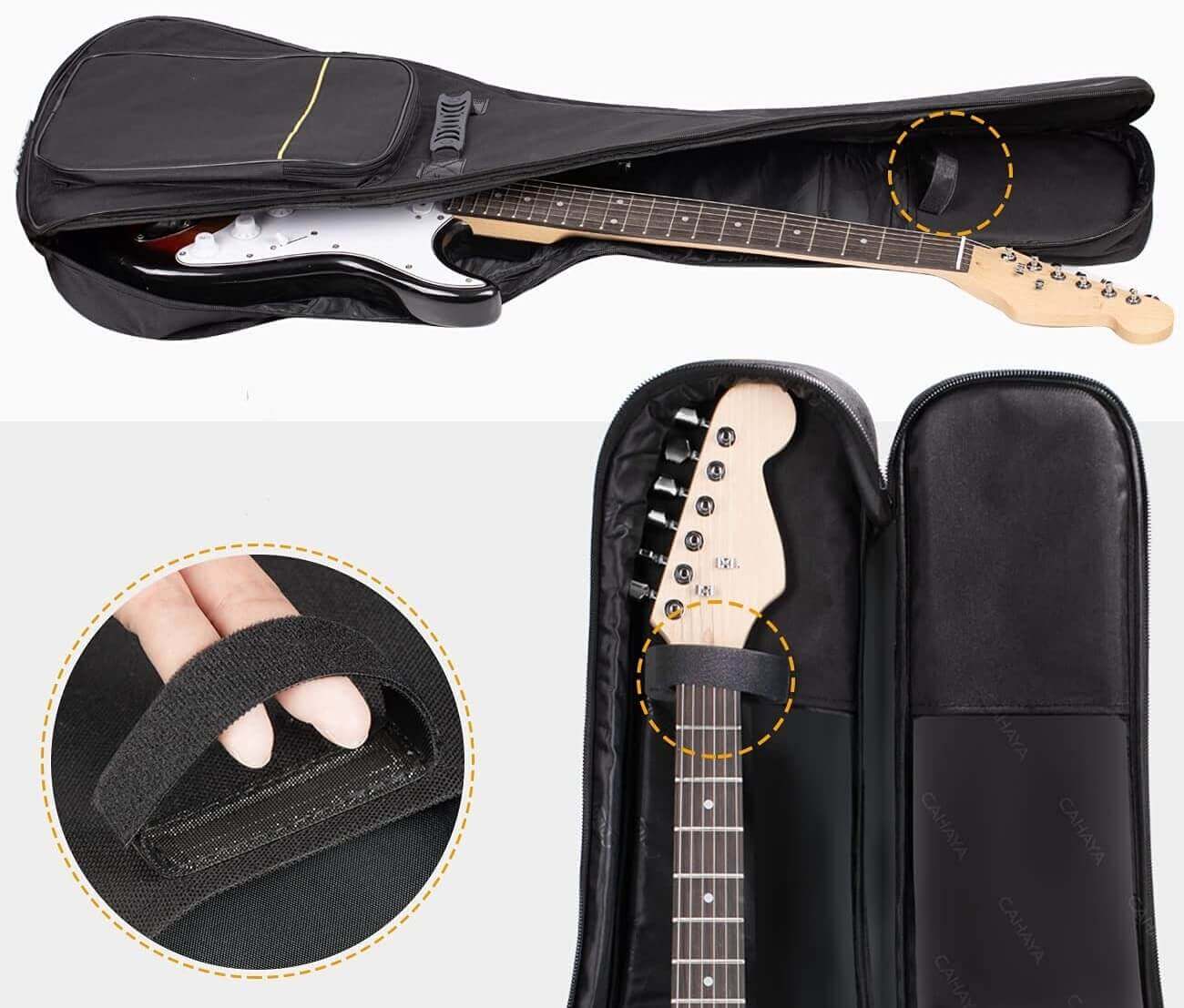
This one in specific is the CAHAYA Guitar Gig Bag, which has options for either electric or acoustic guitars, and basses.
Most gig bags will usually come with some pockets where you can store your accessories, which is always a plus.
3. Hang it on the wall
If you have the space, you can hang your guitar on the wall.
This is not the ideal solution, but it’s better than leaving it out in the open where it can easily get damaged.
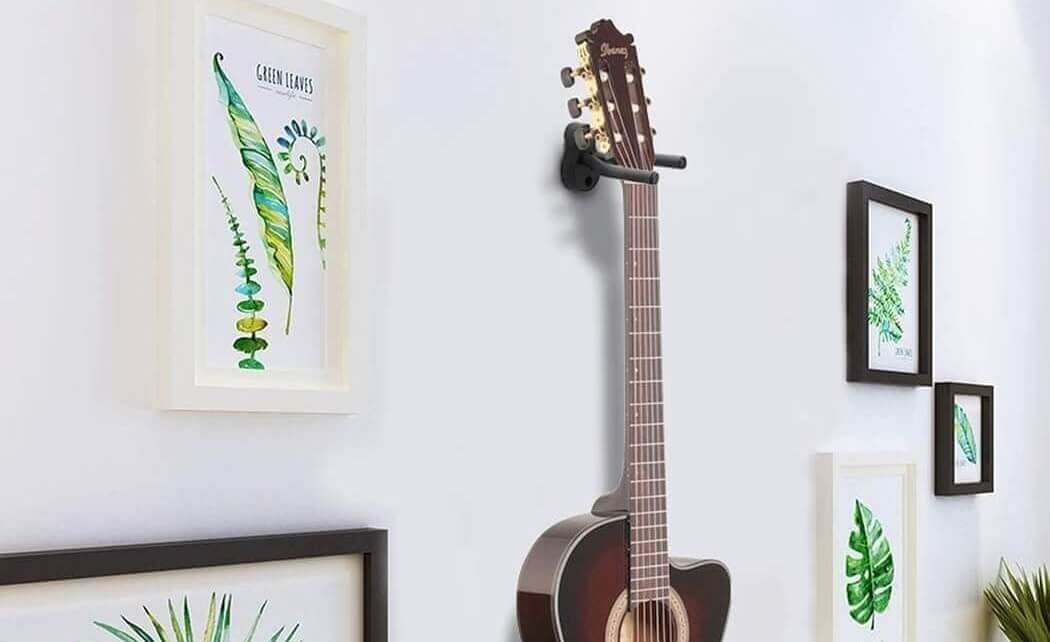
Also, if the guitars are placed high enough, it will help to keep them away from children and pets.
4. Keep it in its original packaging
If you’re not going to be using your guitar for an extended period of time, you can always keep it in its original packaging.
Sometimes, guitars don’t come with a case included in the purchase, which then the manufactures have to opt for other forms of shipping system

These guitar boxes tend to be very strong and the inside is either filled with bubble wrap or some other form of protection.
If you currently have no case, and for some reason saved the original packaging in which your instrument came in, then you can use it.
This is not the best option, as the packaging is not meant to be used long-term, but it’s better than nothing.
5. Store it in a closet
If you have a closet that is big enough, you can store your guitar in it since this will help to keep it out of the way and protected from most unexpected damages.
Also, storing your guitar in a closet will help to keep it away from extreme humidity and prevent any potential damage that could be caused by it.
Even then, though, I would make sure that the humidity levels inside your closets are ideal before putting any instruments.
Check out this article about the best guitar humidifiers on the market that are actually worth getting.
As you can see, there are plenty of ways to protect your guitar without using a case.
Just be creative and use what you have available to you.
And, if you ever do decide to get a case for your guitar, be sure to shop around and find the best one for you.
Here are some tips that you can use to make sure you’re getting a good guitar case:
How to keep your guitar in optimal condition?
There are a number of ways to protect your guitar, but the best way will depend on the type of guitar you have, how often you travel with it, and your budget.
If you have an acoustic guitar, be sure to get a humidifier so that the wood doesn’t dry out and crack.
You should also avoid exposing your guitar to extreme temperatures and direct sunlight.
If you have an electric guitar, you’ll want to make sure that the strings are always clean and in good condition.
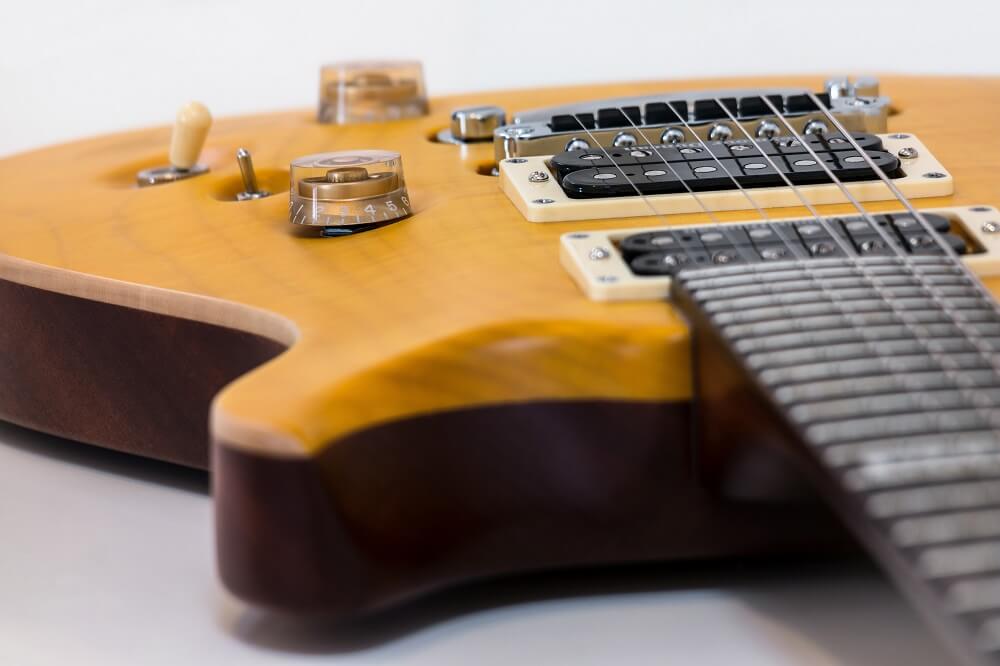
You should also wipe down the body of your guitar after each use to remove any sweat or dirt.
Like we’ve said at the beginning of this post, it’s a good idea to keep your guitar in its case when you’re not using it so that it stays protected from dust, dirt, and other things that could damage it.
At the end of the day, the best way to protect your guitar is by taking care of it and using common sense.
If you’re careful with your guitar, it will last a long time and you’ll be able to enjoy playing it for many years to come.

Born and raised in Florida! I’ve been playing guitars for the past 5 years. Love to learn, and I’m always striving to achieve greater heights in music. Currently have a Fender Stratocaster as my main guitar.



